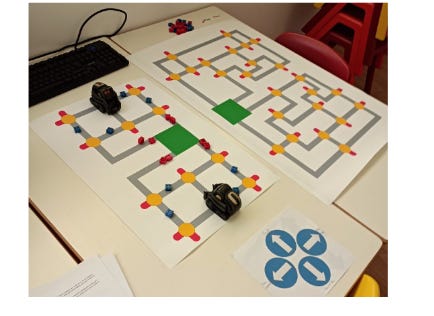Teaching kids spatial reasoning skills with the help of Vector robot
Examine how Vector robot is used in research
From time to time, we visit interesting research that makes effective use of home robots. This week we will review some interesting research from University of Lisbon and KTH Royal Institute of Technology, Sweden that explores how kids can improve their spatial reasoning skills by playing games with the Anki Vector robot. Spatial reasoning skills involve orienting oneself based on a perspective seen by others and make directional choices accordingly, and seem immensely valuable to grow larger STEM related skills. The full details of the work are available here.

What did this study do?
The researchers had 59 3rd grade and 4th grade students from a school in Lisbon, Portugal play physical and virtual versions of a maze game. The design of the game is relatively simple, the robot needs to move to the green large square by following the path denoted in gray. But the path is incomplete and needs to be constructed by picking by the blue tokens. In each turn, a robot (operating autonomously) and a player (operating the other robot) alternate to make a move by choosing one of four directions and then moving to the next yellow circle in the chosen direction. Making an incorrect move might make a robot land on a red square which implies falling off a cliff and losing a life. In the collaborative version, the player and the robot can cooperate to reconstruct their broken paths and each time a blue token is discovered, paths on both sides are re-created. While the competitive version requires the player compete with the other robot to reach the green square first.
Before the game, the children were asked to solve six questions from a commonly used Perspective Taking Spatial Orientation Test (SOT). The children were asked to complete a different set of six questions from the same SOT. The difference in scores was used to understand if the children improved in their spatial reasoning abilities after playing the game. The children were also interviewed to figure out whether they had fun playing the game.
Editor’s Note: This is the last post of 2023. 2023 was a breakthrough year for our forum, our community grew by 3x, and paid subscribers grew by 6x. Our readers now come from 34 countries around the world (See an interesting map below). There was a plethora of research and development around us including lots of groundbreaking ground in Large Language Models (LLMs) and robotic systems. We are happy if we could help you learn something about this interesting world around us. If you would like to help this forum by writing an article or posting an interesting insight from your research, please do drop a note in the comments section. Thank you once again for being a part of our community, and best wishes for a happy and prosperous 2024 to all of you. Happy New Year!



